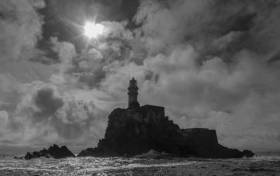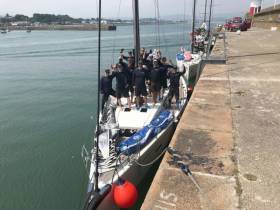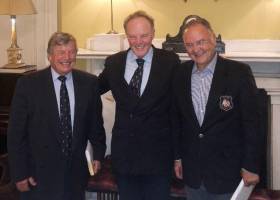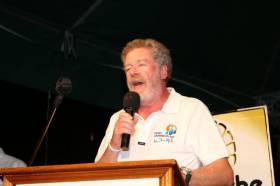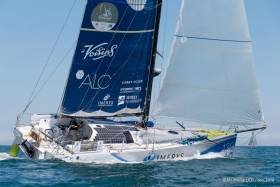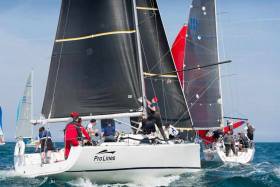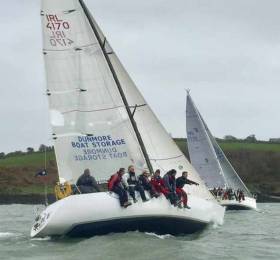Displaying items by tag: RORC
Entries for 340 Fastnet Race Places Snapped Up in Under Five Minutes
Once again the Rolex Fastnet Race has confirmed itself to be by far the world's largest offshore yacht race. After the entry for the Royal Ocean Racing Club's flagship event was opened at 1200 UTC, the 340 available places for boats in the IRC fleet were all taken within just four minutes and 37 seconds. This was just 13 seconds outside the record time recorded in 2017.
The first entry to sign up on the RORC's Sailgate online entry system for the biennial 605-mile race from Cowes to Plymouth via the Fastnet Rock off southwest Ireland, was regular competitor Derek Saunders and his Farr 60 Venomous. He narrowly beat the German Hamburgischer Verein Seefahrt club's Judel Vrolijk 52 Haspa Hamburg and Tom Kneen's JPK 11.80 Sunrise who were next fastest.
After the first two minutes, 180 boats had already been entered successfully. After the first frenetic four minutes and 37 seconds when the maximum entry limit was reached, subsequent requests were filtered through to the reserve list. Ultimately after the deluge subsided 440 boats had entered in total.
Yachts from 25 countries are due to take part this year: The bulk of these are from the UK, from where 201 boats were registered, followed by the dominant French (winners of the last three editions of the Rolex Fastnet Race) with 81 and the Netherlands with 33.
The entry includes a strong contingent of 16 boats from the USA, many making the passage across to the UK in the Transatlantic Race 2019. This leaves Newport, RI on 25 June bound for Cowes via the Lizard and is organised by the RORC in conjunction with the New York Yacht Club, Royal Yacht Squadron and Storm Trysail Club. Entries from further afield have been received from Australia, New Zealand, Russia, Turkey, Hong Kong and Korea among others.
This strong entry shows that the change of date has made little impression on the desire to do the Rolex Fastnet Race: The start date was moved to Saturday, 3 August and for the first time it will be setting off before Lendy Cowes Week (rather than on the traditional Sunday immediately after it).
For the RORC's Australian Racing Manager Chris Stone this is his first Rolex Fastnet entry day experience since taking up his position in Cowes a year ago: "It has been unbelievably busy. Before 1200 we had about 500 people who were all on stand-by, logged into their accounts, which was a good indicator about how busy it was going to be. Then we went straight to 340 and on to 440, including the waiting list."
Among the entries is at least one 100ft maxi while Stone reckons that one of the top fights in the race will potentially be between the six Cookson 50s.
It should be noted that with the Rolex Fastnet Race the RORC has led the way among the organisers of the world's classic 600 milers in inviting other grand prix racing yacht classes to compete outside of the main IRC fleet. This has led to the race featuring some of the very best offshore racing hardware from yachts competing in the Volvo Ocean Race to the giant 100ft long French Ultime multihulls and the IMOCA 60s of the Vendée Globe. For 2019, an especially strong line-up of Class 40s is anticipated. "We are expecting around another 50 boats - thirty Class 40s and twenty IMOCA boats," forecasts Stone.
Meanwhile, for the fleet, there remains the qualification process that will take place over the course of the 2019 season, with teams required to gain adequate miles and experience in order to meet the Rolex Fastnet Race's stringent entry requirements. Competing yachts must complete more than 300 race miles with at least 50% of their Rolex Fastnet Race crew on board.
"I never thought it would so easy to have 400 boats appear on your desk in one day! I am really impressed by the numbers. I have never experienced anything like this," concludes Stone.
2019 RORC Caribbean 600 Early Entries Reveal a Stunning Fleet
Early entries for the 2019 RORC Caribbean 600 reveal a stunning fleet of famous professional teams taking part alongside passionate Corinthian crews. Famed for spectacular sailing conditions on an intricate and mesmerizing course, the 11th edition of the RORC Caribbean 600 is set to be an absolute cracker.
Two months before the start of the race 50 teams have thrown down the gauntlet; over 10% more than the same time prior to the record entry of 88 yachts in 2018. The race is a truly international affair with teams from all over the Caribbean Islands, Canada, Chile, Great Britain, Finland, France, Italy, Germany, the Netherlands, Norway, Sweden, Switzerland and the USA.
For the first time in the history of the race, three ocean-going trimarans in the shape of Jason Carroll's Argo, Giovanni Soldini's Maserati and Peter Cunningham's PowerPlay will be battling for multihull line honours and the race record, set in 2016 by Lloyd Thornburg's Phaedo3 in 31 hours, 59 minutes, 4 seconds.
The IRC fleet racing for the overall win and the RORC Caribbean 600 Trophy, boasts three magnificent yachts; the 203ft (62m) schooner Athos, skippered by Tony Brookes, the 115ft (35m) sloop Nikata, skippered by Tom Brewer, and the 96ft (30m) sloop Sorceress, sailed by Will Apold.
Two Maxi 72s will be locking horns; previous winner George Sakellaris' Proteus and the brand new Bella Mente sailed by Hap Fauth. American Volvo Ocean Race skipper Charlie Enright will be hoping for victory with the American Volvo 70 Wizard. In two previous editions, the race has been won overall by a Cookson 50. This year, two new teams will be hoping to increase the statistic. Franco Niggeler's Kuka3 is on a high from their overall win in the RORC Transatlantic Race and the highly experienced team racing Triple Lindy will be led by Joseph Mele.A record entry of Class40s is also expected to compete in the race. The 2018 Route du Rhum featured 53 of these pocket rockets, bound for Antigua's neighbour island of Guadeloupe. With another transatlantic race organised in March, 10 or more Class40 are likely to take part in the RORC Caribbean 600. Among the early entries is Catherine Pourre's Eärendil which set a new Class40 record for the race last year (2 days 13 hours and 15 seconds).
"We are delighted to be heading back to Antigua for the 11th edition of the RORC Caribbean 600," commented RORC Racing Manager, Chris Stone. "This coming year we are anticipating close to 100 boats from all over the world who will be coming to Antigua to enjoy the challenging racing and amazing weather. We are expecting an extremely good mix from within the fleet, seeing our smallest competitors tussling with the larger race machines for the prestigious IRC overall trophy. As usual, there will be a great welcome party and prizegiving event, plus every yacht will be met dockside with cold beers and a warm welcome from our wonderful team of volunteers."
Round Ireland Race Class One Winner for RORC Transatlantic Race
Two of this Summer's Scandinavian entries in the Round Ireland Race are set for the RORC Transatlantic Race next month. Henrik Bergesen's Norwegian Class40 Hydra plus the class one Round Ireland winner, Arto Linnervuo's Xp-44 Xtra Staerk, the all-Finnish eight-man crew.
Crew from all over the world will be competing in the 2018 RORC Transatlantic Race which sets off from Marina Lanzarote, Arrecife on Saturday, November 24th. The 3,000 nautical mile-long race to Grenada is the final challenge in the Royal Ocean Racing Club's 2018 calendar and is an ideal way to bond a team together for the RORC Caribbean 600 in February 2019.
Franco Niggeler's Swiss Cookson 50 Kuka 3 is one of the favourites for the overall win decided by yachts racing under the IRC Rating Rule for the RORC Transatlantic Race Trophy.
"This will be my first Atlantic crossing and the first part of a project including the RORC Caribbean 600, the Transpac and the Rolex Sydney Hobart," commented Kuka 3's owner Niggeler. "The first few days will be very important with difficult tactical choices which could decide the outcome of the race. Our aim is to do as well as possible as we have a competitive boat and it is up to us to get the best out of it."
Kuka 3 has a highly experienced crew, including Italian navigator Andrea Caracci (11 Mini-Transats) and Spanish Watch Captain Gonzalo Araujo (Volvo Ocean Race and TP52). Kuka 3 will be skippered by Spain's Roberto 'Chuny' Bermudez de Castro who has raced 500,000 nautical miles, including seven round the world races, winning the 2014-15 Volvo Ocean Race with Abu Dhabi Ocean Racing.
Teams from Scandinavia will also be racing in the 2018 RORC Transatlantic Race, including Henrik Bergesen's Norwegian Class40 Hydra (Oslo) and Arto Linnervuo's Finnish Xp-44 Xtra Staerk (Espoo).
Hydra is one of the latest generation Class40 designed by Owen Clarke. Launched in 2017, Bergesen's Hydra was 7th in the 26-strong Class40 fleet racing Two-Handed in the 2017 Rolex Fastnet Race. For the 2018 RORC Transatlantic Race, two British Class40 experts will be on board; Paul Peggs and Pip Hare. Skipper Tristan Kinloch, with plenty of big boat experience, will lead the Hydra crew.
Arto Linnervuo's Xp-44 Xtra Staerk has an all-Finnish eight man crew who have been sailing together since 2016. The overall goal of the team is to promote Finnish offshore racing by attracting more teams from Finland to race with the RORC. The team have even released a Spotify single - Olen Suomalainen (meaning 'I'm Finnish') - which was professionally produced in a Helsinki studio! Xtra Staerk bowman Tuomas is on lead vocals, skipper Arto is the chorus! https://open.spotify.com/track/5E3NL2CD53BvlVWMwrIuEk
"We won IRC One in our first race in the 2018 Volvo Round Ireland Race," commented Linnervuo. "We aim to race across the Atlantic fast, but safely. When racing, we always want to win, but also have fun, paying attention to keeping a good atmosphere on board. We expect tight competition offered by the great teams participating in the race. After the RORC Transatlantic Race the team is planning to participate in the RORC Caribbean 600, Rolex Fastnet Race and Rolex Middle Sea Race."
International IRC Congress Meets at the Royal Irish Yacht Club
Representatives of the International Rating Certificate (IRC) met in Dun Laoghaire for two days of debate and discussion at the beginning of October. The IRC Technical Committee agreed on a number of developments for 2019 as a result of research throughout the year, while the IRC Policy Steering Group reinforced the good relations between the owners of the Rule, the Royal Ocean Racing Club (RORC) and l’Union Nationale pour la Course au Large (UNCL).
As Afloat.ie reported earlier, the annual Congress meeting always proves a good opportunity for delegates to share experiences and ideas between different countries and sailing cultures, and this year was no exception with representatives of IRC from around the world. The 34 Congress delegates came from Australia, Belgium, Bulgaria, Canada, France, Great Britain, Hong Kong, Ireland, Japan, Netherlands, South East Asia, Turkey and the USA; and from organisations including RORC, UNCL, the Royal Yachting Association, Irish Sailing, the Maxi Yacht Association and the Irish Sea Offshore Racing Association (ISORA) whose Chairman Peter Ryan gave a presentation on ISORA activity.
Reports were received from the international IRC Owners’ Associations and Rule Authorities, and from the organisers, competitors and technical committee of the 2018 Hague Offshore Sailing World Championship. In addition, delegates enjoyed an excellent presentation by the Irish Sea Offshore Sailing Association describing their history, activities and promotion. The IRC European Championship was confirmed as San Remo, Italy, 23-29 June 2019.
IRC rule changes were approved for improved rig dimension definitions, clarifying the number of spinnakers allowed and several housekeeping items. Software developments agreed by the Technical Committee for IRC 2019 include the treatment of draft, boats over 30.50m in length, cruisers and classics with relatively low sail area, and the rating of the number of spinnakers. Many of these changes will benefit cruiser designs and classic boats which form an important part of the IRC club fleet.
The 2018 Congress was the final meeting with Peter Wykeham-Martin in the Chair and he was thanked for his dedicated support and excellent leadership. The incoming Chairman of IRC Congress is Irishman Michael Boyd, past Commodore of RORC and an active IRC racer. In addition, Vice Commodore Alp Doguoglu, who has represented IRC at World Sailing, stood down as Vice Chairman and is replaced by Carl Sabbe from Belgium.
RORC Admiral Wants Action on 'Cheating' in Sailing
The Admiral of the Royal Ocean Racing Club in London, Andrew McIrvine, has written to the President of World Sailing, Kim Anderson, seeking action from the World body over the prevalence of 'cheating' in sailing that he maintains is becoming 'a major disincentive to going racing at many levels'.
In a strongly worded letter, McIrivne, who is also the Secretary General of the International Maxi Association, says the ‘culture’ of ‘it’s not cheating unless you are caught’ is becoming increasingly prevalent.
He claims it is a particular problem among some sailing 'professionals' who, he says, have a 'more desperate need to win to maintain their livelihood'.
‘the culture of ‘it’s not cheating unless you are caught’ is becoming increasingly prevalent'
McIrvine's letter laments the fact that the 'sport used to be largely self-policing and honourable. Sadly, he says, 'those days are long gone and it must now become a major function of World Sailing to police the sport effectively'.
The RORC Chief says he wants the World Sailing organisation to take a much firmer line in trying to stamp out the culture. 'This will involve commitment from above down; all the way from the Executive to individual race organising authorities'" he says.
World Sailing McIrvine's letter (dated 30th of January 2018) is posted on the World Sailing website on this link here and it is reproduced in full below:
RATING INTEGRITY AND CHEATING
Dear President,
I am writing because of my deep concern over the rise of cheating within our sport and the lack of use of process and sanctions to deal with it.
This was prompted by the recent announcement by the J70 Class Association of the sanctions they were going to apply to those who had arrived at the 2017 World Championship with boats that had been deliberately altered such that they were no longer in class. They had been disqualified from competing at the event but now 4 months later the sanction applied was as little as a 4-month ban – covering the winter, mainly non-sailing, season.
This appeared totally inadequate as a sentence of this type will be ineffective as a deterrent to increasing flouting of the rules.
I am using this as an example as it is a class with which I have no involvement and am therefore seeing it from an independent stance,
An example from within my sphere was the case of ‘Scugnizza’ a boat eventually disqualified from the 2016 ORC European Championships by an International Jury for blatant measurement anomalies. ORC could do this and ban them from their events but no action was taken by either MNA or WS despite the boat being filled with ‘professionals’.
Bruno Finzi, Chairman of the Offshore Racing Council, supports me in our frustration with the lack of sanction from higher authorities.
Stan Honey, Chairman of the Oceanic and Offshore Committee shares our concerns.
This ‘culture’ of ‘it’s not cheating unless you are caught’ is becoming increasingly prevalent.
It is probably associated with greater involvement of professional sailors who have a more desperate need to win to maintain their livelihood.
Our sport used to be largely self-policing and honourable. Sadly those days are long gone and it must now become a major function of World Sailing to police the sport effectively.
Only serious lengthy bans to individuals perpetrating these offences will have such an effect.
From communication with many sailors, it is clear that this lack of control is becoming a major disincentive to going racing at many levels.
We feel it is imperative that World Sailing as a whole take a much firmer line in trying to stamp out this culture. This will involve commitment from above down; all the way from the Executive to individual race organising authorities.
We very much hope this can be put high on your agenda.
With kind regards,
Yours sincerely,
Andrew J McIrvine FRCS
Member, WS Classes Committee
Secretary-General, International Maxi Association
Admiral, Royal Ocean Racing Club
A third light, tricky day with strong tides at the Royal Ocean Racing Club's IRC Europeans and Commodores' Cup saw a lengthy round the cans course in the central Solent just completed before the wind shut down. After a wait, the skies darkened, the temperature plummeted as a southeasterly wind filled in, lasting just long enough for a singleton windward-leeward to be held for the three classes.
Ireland's sole entry in the competition, the Waterford Harbour A35, Fools Gold, skippered by Rob McConnell is lying fifth in IRC division three.
Provisional Results can be found here
A powerful flood tide off Osborne Bay, pushing boats down towards the pin presented some novel problems along the start line of today's first race. In the starts for each of the three classes, boats were called over early. In IRC One Robert Bicket's Club Swan 42 Fargo was OCS, but remarkably went on to win the complex course, criss-crossing the central-eastern Solent on different points of sail, in varying tidal states.
"We had a few things go our way - a Swan 42 is a great boat in 8 knots of breeze and flat water," observed Bicket, racing his new boat's first regatta with a crew, including several former Solent legends prised from retirement. Thanks to the variable winds and strong tides, there were a few park-ups around the race course and these seemed to work very much in the blue Swan's favour. "We had a few favourable compressions and some good mark roundings, but mainly we just stayed out of trouble," concluded Bicket.
Fargo's victory in race one came at Ino XXX's expense. "We thought we'd won the first race until the wind disappeared 100m from the line and everyone else came in with new breeze," observed owner James Neville. However he and the crew of his HH42 were compensated by winning today's second race, ahead of Mike Bartholomew's higher-rated Tokoloshe II. "We are having a good few days," Neville continued. "We just need more wind, but Stuart [Childerley - PRO] has done a good job keeping things on the road."
Nonetheless, the immaculately consistent Tokoloshe II continues to lead IRC One with no scores lower than second, leaving her five points clear of Andy Williams' Keronimo, with Ino XXX third.
While the First 40s were in the chocolates yesterday, the King 40s fought back in IRC Two today. A 3-3 for Nifty propelled Roger Bowden's team back into the lead, while the Blair family's Cobra managed a convincing win in today's first race, but bombed in the second, leaving her fourth. However the day belonged to Scots Rod Stuart and Bill Ram on their Corby 37 Aurora, which posted a 2-1 elevating her to second in class, three points astern of Nifty.
In the round the cans race, Cobra managed to speed away in clear air, but Aurora defended second well. "The windward start was good for us as we prefer windward-leewards," confided Stuart. "We rounded the first buoy in second in front of the First 40s. When we do that we can generally keep our position, although it's tough in a 12-year-old boat."
As in IRC One, the final tight reach back towards the Isle of Wight into even lighter airs compressed the fleet. "The lead we'd built up became challenged, but it was fine - we then had a great light beat against the tide," continued Stuart. "We are enjoying it, but the very light winds make it challenging."
IRC Three is developing into a two horse race between Michael Mollmann's X-37 Hansen and Didier Le Moal's J/112e J Lance 12. Today definitely belonged to the French who won both races. They now lead, one point ahead of the Danes who posted a 3-2 today.
Jean-Eudes Renier's JPK 1080 Shaitan, chartered to Scottish adventurer Jock Wishart was second in today's first race, but, showing a lack of consistency typical across this fleet thanks to the awkward conditions, was eighth in race two.
As was the case with Fargo in IRC One, so Shaitan was called OCS in today's first race but recovered well. "It was a pushy line," recounted jib trimmer Ruaridh Wright, who at 22 is one of several young Scottish sailors competing. "We fought our way through all the dirt, just finding lanes, got to the right side of the course and came out at the top mark in fourth or fifth. It was a constant battle to keep the boat moving. When we reached the other side of the Solent we managed to get away a bit, while the boats ahead fell into a hole in Osborne Bay. We managed to overtake another two boats on the way in- it was a scrappy fight, but we came out alright."
Kings High on the rise as the Celtic Team reasserts itself
In the Commodores' Cup, Jock Wishart's Celtic Team managed to build itself a cushion on day three of the competition and is now 19 points in front of Kings High, comprising the two King 40s, Nifty and Cobra, plus Mike Bridge's Elan 37 Elaine racing in IRC Three. This was despite the Celtic Team's Shaitan along with her team mates, the First 40 Adventurer and Andrew Williams' Ker 40 Keronimo all experiencing mixed results today.
A change of schedule for the remaining four days of the IRC European Championship and Commodores' Cup was announced this evening, with the offshore race, originally due to take place over Wednesday-Thursday now replaced by a race around the Isle of Wight on Thursday. This race was started yesterday but abandoned due to light wind.
Fortunately, good breeze is forecast from tomorrow afternoon for the remainder of the week, with the strongest set to coincide with the rescheduled lap of the Isle of Wight. Inshore races will take place on the remaining days.
#RB&I - A record 10 Class40s have entered the Sevenstar Round Britain and Ireland Race and more are expected to take up the tough 1,800 nautical mile non-stop race this August.
Starting and finishing from Cowes on the Isle of Wight, the course takes the fleet as far north as Muckle Flugga in the Shetland Islands on the 61st parallel — shared by Alaska and the Bering Sea.
The 2018 race is an official event for the 2018 Class40 circuit and since the class first competed in the race in 2006, only five have finished the gruelling challenge.
In 2006, Britain’s Phil Sharp became the first Class40 skipper to finish the race and he went on to win the Route du Rhum later that year.
Fast forward to June 2018 and Sharp with co-skipper Julien Pulve was victorious in the 1,000nm Normandy Channel Race, winning by just six seconds after six days of racing.
For the 2018 Sevenstar Round Britain and Ireland Race starting on Sunday 12 August, Sharp will skipper Class40 Imerys and is one of the favourites to win the class.
“The diversity of racing around Britain and Ireland is a real challenge. You can get everything possible thrown at you. Just finishing gives tremendous satisfaction and makes you all the stronger for it,” Sharp said.
“We didn’t do very well in 2006, but it was my first proper race in the Class40 and it was invaluable for the win in the Route du Rhum.
“It is a coastal race but you rarely see land and the course takes you further north than just about any offshore race. The weather can get very extreme and very cold. Racing in howling winds, fully in winter gear, makes it very easy to forget it is August.
“Pushing the boat to the limits can be stressful, but it is an amazing experience, surfing down waves getting doused in blue water. A Class40 transforms itself into a dinghy, especially the modern ones which are highly optimised racing machines.”
The majority of the Sevenstar Round Britain and Ireland Race fleet will be racing under the IRC Rating system with additional classes for Class40, MOCRA and IMOCA. This year’s race is also expected to have a record entry for two-handed challengers, among them Liam Coyne’s Lulu Belle.
All boats will carry trackers and full coverage of the race is available on the Sevenstar Round Britain and Ireland Race website.
RORC Focus on Europe as Wicklow's Round Ireland Race Counts Towards Season's Points Championship
The 2018 Royal Ocean Racing Club Season's Points Championship continues with the first of the domestic offshore races, the Cervantes Trophy, which starts on May 5th followed by the North Sea Race, which starts on May 11th. In excess of 300 teams are expected to take part over the course of the season with sailors from around the globe racing in the biggest offshore sailing competition in the world. There are six European destinations: Belgium, France, Great Britain, Ireland, Malta, and the Netherlands. Five races are to count for Class Honours, and the highest total score will designate the winner overall racing under IRC.
Entries include some of the world's fastest professional crewed maxis and multihulls, However, more often than not, a passionate well-sailed Corinthian team is the overall winner. After a memorable RORC Caribbean 600, the focus is now firmly on European waters with the majority of races starting on the Royal Yacht Squadron Line, within sight of the RORC Cowes Clubhouse. This year, the championship includes the North Sea Race, Volvo Round Ireland Race, Sevenstar Round Britain & Ireland Race, Rolex Middle Sea Race, and the RORC Transatlantic Race.
A sizeable fleet in excess of 60 yachts is expected for the Cervantes Trophy Race, from Cowes to Le Havre, which will have a flexi-course of 110-160 nautical miles across the English Channel. IRC champions from 2017 competing in the Cervantes Trophy include James Neville's INO XXX, Rob Craigie's Bellino, and Noel Racine's Foggy Dew. Gilles Fournier's Pintia will be attempting to win the Cervantes Trophy for a third year in a row and start the defence of their overall win of IRC Two in the RORC Season's Points Championship. The race to Le Havre is a special one for Pintia, as Gilles Fournier explains.
“I have been a member of the Société des Régates du Havre for over 65 years, and my daughter, Corraine Migraine is a past Commodore. This year the race is in early May, so the sea will still be cold, but I can assure everyone of a warm welcome at the club, which is the oldest in mainland Europe (Est. 1838) and has an excellent new menu. Pintia will not have as intensive a season as last year due to work commitments. However, we are definitely aiming to defend our title, Pintia has new sails for the season, and our IRC endorsed certificate is the same as last year.”
The North Sea Race, starting on May 11th, is hosted by the Royal Harwich Yacht Club, on the River Orwell in Suffolk, and finishes in Scheveningen, Netherlands. Daniel Hardy, boat captain of the Ker 46 Lady Mariposa, confirms that the Hamble based team will be defending their IRC Zero RORC Season's Points Championship title and will be kicking off their campaign with the North Sea Race. British Volvo Ocean Race, and Jules Verne sailor Nigel King, will be the offshore skipper and match racing World Champion and America's Cup sailor Jesper Bank, continues as inshore skipper.
“2018 is the start of our big offshore campaign for 2019, which will include the RORC Caribbean 600 and the Rolex Fastnet Race.” commented Hardy. “Nigel brings a tremendous amount of experience and enthusiasm to the team, and we are especially looking forward to racing against the Dutch Ker 46 Van Uden in the North Sea Race. Last year, we beat them on the water but they got us on corrected by a few minutes. It should be a great battle all season but a friendly one, we are actually doing some two boat testing with them once Lady Mariposa is in the Netherlands.”
A Prize Giving for each race is normally held at the Royal Ocean Racing Club's London Clubhouse, with a glittering Royal Ocean Racing Club Annual Dinner & Prize Giving at a top London venue in November.
Waterford's 'Fools Gold' To Contest IRC Europeans in Cowes
Sovereign's Cup winner Fools Gold skippered by Rob McConnell from Waterford Harbour Sailing Club will contest the first IRC European Championship ever to be held on the Solent in mid-June. The Irish boat will be hoping for a repeat of the success of Royal Cork's Paul Gibbons, when the Cork Harbour sailor had an IRC Euros class win at the inaugural event, staged as part of Cork Week in 2016.
McConnell launches the race-winning A35 on Monday in Dunmore East after an extensive refit that includes a refaired keel. As Afloat.ie previously reported, Fools Gold, will sail to Howth Yacht Club for June's inaugural Wave Regatta and straight after that the crew head for the Euro contest on the Solent.
But it's only part of an ambitious campaign this season as the Waterford Harbour crew will also contest the first ever IRC/ORC Offshore World Championships in the Hague, a month later.
McConnell's crew, limited to eight, will be similar to the team that won the 2017 Sovereign's Cup and also the IRC Welsh Championships. 2004 Olympian Tom Fitzpatrick is tactician, Roy Darrer is helmsman, Skipper McConnell is mainsail trimmer, Graham Curran is trimmer number one, Dougie Power is trimmer number two, Brian O'Donnell is mastman, Lisa Tait is in the Pit and the bowman is to be announced. Chris Frost will come onboard as a guest navigator for the Solent event.
The Solent represents the spiritual home of IRC, the rating rule which the Royal Ocean Racing Club runs jointly with its French counterpart, the Union Nationale pour la Course au Large. It is also historically significant - Cowes Week was first held here in 1826 and the first America's Cup (as it would become) in 1851. The Round the Island Race, today one of the largest participation events in sailing, starts from here as does the RORC's own Rolex Fastnet Race, first held in 1925, and now the world's largest offshore race. Running over 10-16th June, the IRC Europeans, the most prestigious title to win under the RORC/UNCL's rating rule, will mark a new chapter in Solent yacht racing history.
British and French boats are traditionally strongest competitors under IRC: A British boat has won the RORC Seasons Point Championship for the last two years, but in 2015 France owned the entire podium. French boats have won the last three Rolex Fastnet Races and are the present holders of the Commodores' Cup, which a British team last won in 2012.
There will be no let-up in Anglo-French competition this season with both sides campaigning examples of IRC's hottest new boat: The 1180 comes from JPK Composites, who's 1080 won the 2015 Rolex Fastnet Race, while their 1010 claimed it in 2013 - both campaigned by top French crews. Another Jacques Valer design, the 1180 has more volume forward and a more pronounced chine.
Campaigning JPK 1180 #1 is French legend Géry Trentesaux, the 2015 Fastnet winner who led the French Commodores' Cup team to victory in 2006. His Courrier Recommande finished second to a runaway TP52 in her first outing at Spi Ouest-France over Easter. The IRC Europeans will be one of her first major events: "I like to sail in Cowes and I am a member of the RORC, so it is a good idea to come and race against all my English friends," says Trentesaux.
The IRC Europeans schedule follows the same well-refined format as the Commodores' Cup with eight inshore races (windward-leewards, round the cans, some reaching starts), an Around the Isle of Wight (1.5x coefficient) and a 150 mile/30-36 hour offshore (2x coefficient). "The offshore races are not so big," says Trentesaux. "And Cowes in June is wonderful - I am very happy to come back. But we have a new boat. At present she is okay in strong and light weather, but not in medium downwind - we don't have enough spinnaker area. Otherwise she is very nice."
Also campaigning a JPK 1180 at the IRC Europeans is Britain's Tom Kneen. "It will be a really interesting week between Sunrise and Courier, but they will have some more weeks training than us," he says. Compared to the wily veteran Trentesaux, Kneen is much newer to sailing having only acquired his first boat four years ago. Since then he has been enthusiastically campaigning his boats, which, like Trentesaux, culminated in a JPK 1080.
Kneen acknowledges that winning the IRC Europeans is a big ask. "Four years ago I had no idea that one day winning the IRC Europeans would be an ambition. If we came out on top I would be bouncing off the walls with excitement. If we podium I will be dancing!" Kneen is also gathering a three boat team to compete in the Commodores' Cup, which for the first time is being scored concurrently with the IRC Europeans.
The 2018 IRC Europeans is open to yachts with IRC Endorsed certificates and TCCs of 0.995 up to 1.270. At the grand prix end the line-up includes FAST 40+s like Mike Bartholomew's former GP42 Tokoloshe II and James Neville's HH42 INO XXX and the de Graaf family from the Netherlands on their newly acquired Ker 43 Baraka GP. But the event provides ample opportunity for smaller boats to come out on top - if they are sailed well.
Paul Gibbons' Quarter Tonner Anchor Challenge won in Cork in 2016
In fact the first two IRC Europeans winners were among the shortest: Paul Gibbons' Quarter Tonner Anchor Challenge won in Cork in 2016 while in Marseille last year Guy Claeys' JPK 10.10 Expresso 2 was crowned IRC European Champion, racing in IRC Four.
Among the lowest rated boats competing this year is Mike Bridges' Elan 37 Elaine. Since Bridges acquired her 13 years ago Elaine has been a regular at the IRC Nationals. The IRC Europeans, he says, is just the next step up. "We were looking for something different to do. This came up and we thought we'd give it a crack. We are not doing any other big regattas this year."
Elaine is kept in top condition for racing, she's dry-sailed and with the help of North Sails, Bridges has had her converted to a non-overlapping headsail set-up to lower her IRC rating. These days he admits they don't do much racing offshore, but they have all the experience and it isn't daunting for them. However "if there is some breeze, we'll be alright. If it is light and horrible, we'll be at the back of the fleet," he warns.
The RORC IRC Europeans takes place over 10-16 June 2018 with a race around the Isle of Wight on Monday 11th June and the overnight race over the Wednesday-Thursday, 13-14th June.
Hiking on the Rail – Human Ballast in Cruiser Racing
There has been controversy and disagreement in cruiser racing about crews ‘hiking out’ through lifelines on deck to get more upper body weight extended to help boat balance and performance … Rule changes have now come to “sitting on the rail” – an essential part of cruiser racing - though not always a pleasant or desired one, particularly in rough upwind conditions.
Extending the body as far out as possible, between lifelines, has become more obvious, even though that has been frowned upon by those who claim that the racing rules allow only for sitting on deck with the body fully inside the lifeline rails – apart from the legs of course, on the outside.
Now the IRC racing authorities have bowed to the inevitability of recognising reality and modified the rule on yacht ‘Crew Positions’ - This doesn’t seem to have got a lot of attention yet, but the racing season is only getting underway
“It is not unusual for crew sitting on the rail to be supported only at their upper legs when hiking facing outboard”
“The term ‘sitting on the deck’ is difficult to define,” the IRC Technical Committee has acknowledged…..
“It is not unusual for crew sitting on the rail to be supported only at their upper legs when hiking facing outboard,” it said in announcing the rule change.
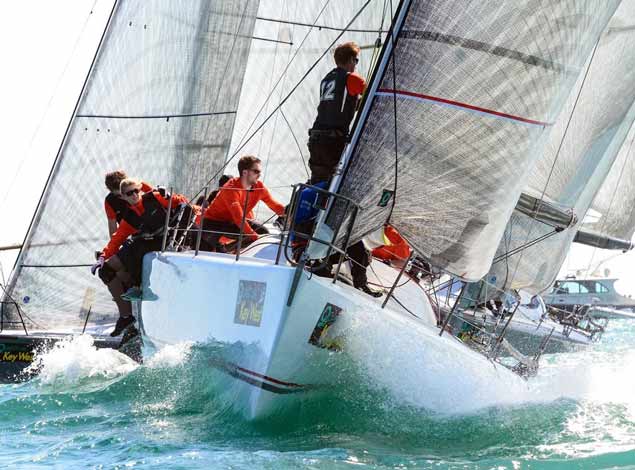 Sitting on the rail
Sitting on the rail
To avoid unnecessary and difficult protests, the IRC says it has decided on “a simple and effective solution” … removing rule requirements but keeping the original intention so - When there are two lifelines, competitors facing outboard with their waists inside the lower lifeline may have the upper part of their bodies outside the upper lifeline ….
Lifelines shall be taut “ which is a proper safety requirement anyway, though not always observed as I have seen…. So the IRC change is just bringing reality to racing….
It would be good to see another change in the process of “sitting on the rail…” to where quite a few newcomers to the sport have told me over the seasons that they were sent when they asked to join a crew to get into sailing.
I’ve been told by quite a few that they were never given any further involvement with the boats they were crewing on, never learned much about sailing, so they left the sport…. Others seemed satisfied enough to be “human ballast”….
I’m not sure that does anything much for the popularity of our sport…..
Podcast below


























